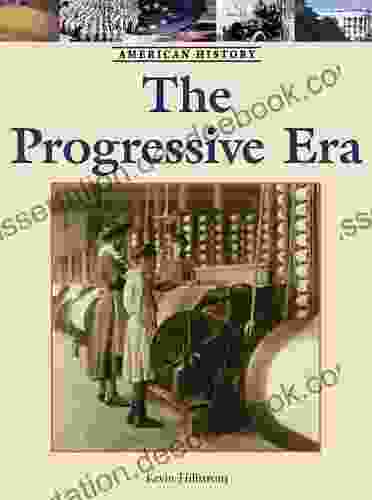The Progressive Era: A Transformative Period in American History

The Progressive Era, a vibrant and transformative chapter in American history, unfolded between the late 19th and early 20th centuries. It was an era characterized by widespread dissatisfaction with the excesses of industrialization, urbanization, and political corruption. In response to these challenges, a diverse coalition of reformers emerged, advocating for a wide range of progressive ideals.
The Progressive Movement's roots lay in the Populist movement of the 1890s. Populists, primarily farmers and laborers, railed against the perceived injustices of the day, particularly the growing power of corporate monopolies and the influence of political machines. Many Progressive reformers, including future presidents Theodore Roosevelt and Woodrow Wilson, were influenced by Populist ideas.
The Progressive Era was a period of remarkable ferment, with reformers tackling a wide range of issues. Several key themes emerged as central to the movement:
4.5 out of 5
| Language | : | English |
| File size | : | 7338 KB |
| Screen Reader | : | Supported |
| Print length | : | 104 pages |
| Hardcover | : | 354 pages |
| Item Weight | : | 1.33 pounds |
| Dimensions | : | 6 x 1.08 x 9 inches |
Progressives believed that the political system was broken, plagued by corruption and the undue influence of special interests. They advocated for a variety of reforms to make the system more democratic and responsive to the needs of the people. These reforms included:
- Direct Primary Elections: Replacing party conventions with primary elections, where voters could directly elect candidates.
- Initiative and Referendum: Allowing citizens to propose and vote on laws directly.
- Recall Elections: Empowering voters to remove elected officials before the end of their terms.
Industrialization had created vast fortunes for a few, while leaving many others in poverty and exploitation. Progressives sought to regulate the excesses of capitalism, curb monopolies, and protect workers from unsafe and unfair labor practices. Some of the most significant regulatory measures included:
- Antitrust Laws: Breaking up monopolies and trusts that stifled competition.
- Food and Drug Administration (FDA): Enforcing standards for food and drug safety.
- Wage and Hour Laws: Establishing minimum wages and maximum work hours.
Progressives were deeply concerned about the plight of the poor, the working class, and other marginalized groups. They advocated for social justice reforms to improve the lives of all Americans. These reforms included:
- Sanitation and Public Health: Improving living conditions in urban slums and reducing the spread of disease.
- Child Labor Laws: Prohibiting child labor and setting minimum age requirements for workers.
- Settlement Houses: Establishing community centers to provide services and support to the poor.
Rapid industrialization and population growth had taken a heavy toll on the nation's natural resources. Progressives called for the conservation of forests, water, and other resources to ensure their availability for future generations. Some of the most influential conservationists of the era included:
- Theodore Roosevelt: Known as the "Conservation President," Roosevelt established national parks and forests to protect America's natural heritage.
- John Muir: A naturalist and founder of the Sierra Club, Muir fought for the preservation of wilderness areas.
- Gifford Pinchot: A forester and Chief of the Forest Service, Pinchot advocated for sustainable forest management.
The Progressive Movement attracted a diverse cast of reformers, including politicians, journalists, social workers, and academics. Several figures played a particularly prominent role:
President Theodore Roosevelt was a towering figure of the Progressive Era. Known as a "trust buster," he broke up large corporations and advocated for social justice reforms. Roosevelt's "Square Deal" platform promised a fair deal for all Americans, regardless of their wealth or status.
Woodrow Wilson, another Progressive President, focused on reducing tariffs, regulating businesses, and reforming the banking system. His signature achievement was the Federal Reserve Act, which established the Federal Reserve System to regulate the banking industry.
Jane Addams was a pioneering social worker and founder of Hull House, a settlement house in Chicago. Addams provided medical services, education, and childcare to thousands of immigrants and poor Americans. She was a leading advocate for peace and women's suffrage.
Upton Sinclair was a muckraking journalist whose exposé novel, "The Jungle," exposed the unsanitary practices of the meatpacking industry. His writings sparked public outrage and led to the passage of the Meat Inspection Act.
The Progressive Movement had a profound impact on American society. Its reforms transformed the political system, regulated the economy, and improved social conditions for many Americans. Some of the lasting legacies of the Progressive Era include:
- Increased Democracy: The expansion of direct democracy through initiatives, referendums, and recall elections gave citizens a greater voice in their government.
- Strengthened Social Safety Net: The establishment of programs such as social security, unemployment insurance, and worker's compensation provided a safety net for the elderly, the unemployed, and the injured.
- Conservation and Environmentalism: The establishment of national parks and forests, as well as the creation of the National Park Service, laid the foundation for modern conservation and environmental protection.
The Progressive Era was a period of great social, political, and economic ferment. Its reforms had a lasting impact on American society, shaping the way we govern ourselves, regulate our economy, and protect our environment. As we navigate the challenges of the 21st century, we can draw inspiration from the Progressive Era's legacy of reform, regulation, and social justice.
The Progressive Era was a transformative period in American history, characterized by widespread reform, regulation, and social justice initiatives. Progressives fought for a more democratic and equitable society, addressing the challenges of industrialization and urbanization. Their efforts had a profound impact on the nation, strengthening democracy, regulating the economy, and improving social conditions. The legacy of the Progressive Era continues to shape American society today, inspiring us to seek a more just and sustainable future.
4.5 out of 5
| Language | : | English |
| File size | : | 7338 KB |
| Screen Reader | : | Supported |
| Print length | : | 104 pages |
| Hardcover | : | 354 pages |
| Item Weight | : | 1.33 pounds |
| Dimensions | : | 6 x 1.08 x 9 inches |
Do you want to contribute by writing guest posts on this blog?
Please contact us and send us a resume of previous articles that you have written.
 Novel
Novel Page
Page Text
Text Genre
Genre Reader
Reader Magazine
Magazine Paragraph
Paragraph Sentence
Sentence Bookmark
Bookmark Shelf
Shelf Glossary
Glossary Bibliography
Bibliography Annotation
Annotation Footnote
Footnote Manuscript
Manuscript Scroll
Scroll Tome
Tome Bestseller
Bestseller Classics
Classics Narrative
Narrative Autobiography
Autobiography Encyclopedia
Encyclopedia Dictionary
Dictionary Thesaurus
Thesaurus Narrator
Narrator Catalog
Catalog Borrowing
Borrowing Archives
Archives Research
Research Academic
Academic Journals
Journals Reading Room
Reading Room Special Collections
Special Collections Literacy
Literacy Study Group
Study Group Thesis
Thesis Storytelling
Storytelling Reading List
Reading List Book Club
Book Club Theory
Theory Robert Barros
Robert Barros Jessamyn Salinas
Jessamyn Salinas Matti Kurvinen
Matti Kurvinen Susan K Marlow
Susan K Marlow Sophie Smith
Sophie Smith Tony Proctor
Tony Proctor Damiano Bacchin
Damiano Bacchin Janet Garman
Janet Garman Betty White
Betty White Kobo Abe
Kobo Abe Boria Sax
Boria Sax Paul Read
Paul Read Danielle Thorne
Danielle Thorne Phil Duncan
Phil Duncan John O Hurley
John O Hurley Jermaine Dupri
Jermaine Dupri Christina Shelton
Christina Shelton Brent Reilly
Brent Reilly Matt Newton
Matt Newton Dave Kilgore
Dave Kilgore
Light bulbAdvertise smarter! Our strategic ad space ensures maximum exposure. Reserve your spot today!

 Carter HayesThe Enchanting Fingerpicking Guitar Tune by Peter Upclaire: A Masterclass in...
Carter HayesThe Enchanting Fingerpicking Guitar Tune by Peter Upclaire: A Masterclass in... Ernest PowellFollow ·12.5k
Ernest PowellFollow ·12.5k Giovanni MitchellFollow ·2.7k
Giovanni MitchellFollow ·2.7k Curtis StewartFollow ·9.9k
Curtis StewartFollow ·9.9k Ernesto SabatoFollow ·14.5k
Ernesto SabatoFollow ·14.5k Charles BukowskiFollow ·15.3k
Charles BukowskiFollow ·15.3k Reed MitchellFollow ·4.1k
Reed MitchellFollow ·4.1k Jeremy MitchellFollow ·12.6k
Jeremy MitchellFollow ·12.6k Floyd PowellFollow ·10k
Floyd PowellFollow ·10k

 Keith Cox
Keith CoxFrench Pieces for Flute and Piano: A Journey into...
The world of...

 Justin Bell
Justin BellThe Big Clarinet Songbook: A Musical Treasure for...
The clarinet, with its rich...

 Jamie Blair
Jamie BlairThe Metamorphoses of Ovid: A Masterpiece of...
An Epic Tapestry of Mythology and...

 Alan Turner
Alan TurnerBaa Baa Black Sheep: A Classic Sing-Along Song for Kids
Baa Baa Black Sheep...

 Bradley Dixon
Bradley DixonUnveiling the Enigmatic Shakespeare Spy: The...
Prologue: The Shadowy World...

 Gilbert Cox
Gilbert CoxUnleash Your Creativity with Plastic Craft Lace Projects:...
Plastic craft lace is a...
4.5 out of 5
| Language | : | English |
| File size | : | 7338 KB |
| Screen Reader | : | Supported |
| Print length | : | 104 pages |
| Hardcover | : | 354 pages |
| Item Weight | : | 1.33 pounds |
| Dimensions | : | 6 x 1.08 x 9 inches |










